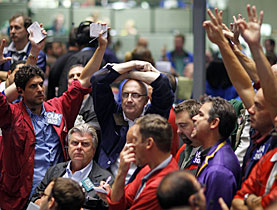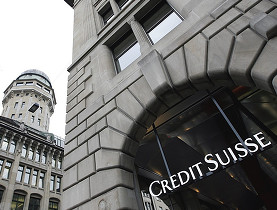World markets surge on US intervention plans

The Swiss Market Index (SMI) rose more than six per cent on Friday, reflecting broad-based confidence that a troubled global financial system could somehow recover.
Switzerland’s blue chip index climbed 401.92 points to close the week at 7,025.17, although still down 190.33 points compared with seven days ago.
Shares in UBS, Switzerland’s largest bank, closed almost 37 per cent higher at SFr21 ($19.11), while Credit Suisse Group finished at SFr56 per share, up 18 per cent.
Buoyed by a temporary ban on short sales of financial stocks and by intervention on the part of the United States government to calm frayed nerves, the Dow Jones Industrial Average in New York climbed about 370 points to 11,389.
It has gained roughly 780 points over the past two days, almost making up for about 800 points in losses over the first three days of the week.
In Europe, the leading FTSEurofirst 300 index set a one-day record, unofficially closing 8.26 per cent higher. It finished the day at 1,151.49 points after rising as high as 1,153.38. The index has nevertheless fallen 23.6 per cent so far this year, while the SMI is down 17.2 per cent.
Shares on the MICEX, Russia’s primary exchange, surged nearly 20 per cent in the first hour of trading, finishing the day 28.7 per cent higher. Hong Kong shares closed up 9.6 per cent, Shanghai soared by nearly 9.5 per cent and Tokyo closed up 3.76 per cent.
Move from safe havens
Both the Swiss franc and the Japanese yen, so-called “safe haven” currencies that had earlier in the week attracted investors fleeing the dollar, posted losses today as steps by US authorities to boost liquidity and shore up confidence revived the appetite for risk.
The franc fell 0.8 per cent compared with its New York close to 1.1159 against the dollar, as investors poured money back into markets on news the US government was considering a plan to deal with the toxic bank assets causing the credit crisis.
Switzerland’s Finance Minister Hans-Rudolf Merz on Friday had no specific comment on the US government’s rescue plans but earlier, spokesman Oswald Sigg said Swiss banks had a sufficient equity base to ride out the storm.
This week, two US institutions did not. Investment bank Lehman Brothers collapsed under a mountain of debt while besieged rival Merrill Lynch was taken over by Bank of America.
Wall Street began its comeback on Thursday after the central banks of Switzerland, the European Union, Japan and Canada announced they would offer some $90 billion in short term loans to financial institutions in an effort to boost liquidity.
US government intervention
US Treasury Secretary Henry Paulson on Friday sketched out wide-ranging plans to confront the worst US financial crisis in decades, outlining a programme he said could cost US taxpayers “hundreds of billions” of dollars to help resolve the country’s financial crisis.
He gave few details but said he would work through the weekend with legislators flesh out the programme, the biggest proposed government intervention in financial markets since the Great Depression.
Before the markets in the US opened, Washington followed Switzerland, Britain and Ireland in announcing plans to block short selling in financial securities.
Short selling is a trading method that bets the stocks will go down and, uncharacteristically by US authorities, had been publicly cited as a primary factor behind the dramatic drop in US bank stocks.
Earlier, US President George W. Bush authorised his country’s treasury to tap up to $50 billion (SFr55.1 billion) from a Depression-era fund to insure the holdings of eligible money market mutual funds.
Washington already has pledged more than $600 billion in the past year to bail out, or help bail out, some of the biggest names in American finance.
swissinfo with agencies
Switzerland’s blue-chip index closed Friday at 7,025.17, up 6.07%.
It has fallen 17.2% since the beginning of this year and 22% over the past 52 weeks.
It is still 2.64% lower than one week ago.
Over the past 52 weeks, the SMI has climbed as high as 9,243.79 and fallen as low as 6,422.85.
Global financial markets began a bad week when investment bank Lehman Brothers collapsed under the weight of subprime mortgage debt and filed for bankruptcy after failing to find a buyer on Monday.
The news rang alarm bells around the globe as other banks calculated how much money they would lose from deals previously struck with the 158-year-old institution.
On the same day, investment bank Merrill Lynch was forced to accept defeat and was sold at a knockdown price of $50 billion to Bank of America. The deal mirrored the humiliating sale of Bear Stearns to JP Morgan in March.
On Wednesday, the US government bailed out the liquidity-challenged AIG, the world’s largest insurer, with $85 billion in available cash. It grew the total extended by the US government to $900 billion.
On Thursday, the first financial victim in Europe emerged. The largest British mortgage bank, Halifax Bank of Scotland, was taken over by rival Lloyds TSB.
On Friday, markets surged as the US government drew up a rescue plan for at-risk securities and bad loans.

In compliance with the JTI standards
More: SWI swissinfo.ch certified by the Journalism Trust Initiative



You can find an overview of ongoing debates with our journalists here. Please join us!
If you want to start a conversation about a topic raised in this article or want to report factual errors, email us at english@swissinfo.ch.